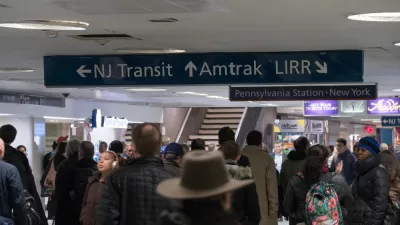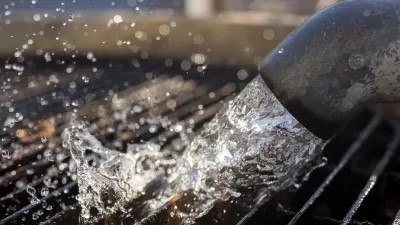The WIFIA federal loans program provides start-up capital to local water infrastructure projects. The program is designed to encourage experimentation and cost-effective construction strategies.

The Trump administration's infrastructure plan remains unclear, especially as press conferences on the subject devolve into controversial (to put it mildly) off-the-cuff remarks on national tragedies. Nevertheless, the Brookings Institution is still looking at how Washington could move forward on infrastructure, and it has identified the EPA's Water Infrastructure Finance and Innovation Act (WIFIA) program as a good bet.
Citing its bipartisan support, Joseph Kane writes, "WIFIA offers greater financial flexibility to a wide variety of utilities, municipalities, and other eligible entities who may lack the capacity to fund water infrastructure upgrades, by helping cover up to 49 percent of project costs and targeting large-scale improvements."
"Unlike federal grants, WIFIA loans depend more on the ability of borrowers to generate revenue, reduce investment risk, and consider other forms of private and nonfederal financing; as a result, it is estimated that the initial federal subsidy can drive more than $2 billion in water loans."
Kane concludes by qualifying all of this. "Time will tell how effective these loans can be in getting projects done nationally, but they mark a step in the right direction at a moment with little to no infrastructure leadership in Washington."
FULL STORY: Despite federal infrastructure cuts, EPA’s WIFIA water loan program holds promise

Planetizen Federal Action Tracker
A weekly monitor of how Trump’s orders and actions are impacting planners and planning in America.

Congressman Proposes Bill to Rename DC Metro “Trump Train”
The Make Autorail Great Again Act would withhold federal funding to the system until the Washington Metropolitan Area Transit Authority (WMATA), rebrands as the Washington Metropolitan Authority for Greater Access (WMAGA).

The Simple Legislative Tool Transforming Vacant Downtowns
In California, Michigan and Georgia, an easy win is bringing dollars — and delight — back to city centers.

The States Losing Rural Delivery Rooms at an Alarming Pace
In some states, as few as 9% of rural hospitals still deliver babies. As a result, rising pre-term births, no adequate pre-term care and "harrowing" close calls are a growing reality.

The Small South Asian Republic Going all in on EVs
Thanks to one simple policy change less than five years ago, 65% of new cars in this Himalayan country are now electric.

DC Backpedals on Bike Lane Protection, Swaps Barriers for Paint
Citing aesthetic concerns, the city is removing the concrete barriers and flexposts that once separated Arizona Avenue cyclists from motor vehicles.
Urban Design for Planners 1: Software Tools
This six-course series explores essential urban design concepts using open source software and equips planners with the tools they need to participate fully in the urban design process.
Planning for Universal Design
Learn the tools for implementing Universal Design in planning regulations.
Smith Gee Studio
City of Charlotte
City of Camden Redevelopment Agency
City of Astoria
Transportation Research & Education Center (TREC) at Portland State University
US High Speed Rail Association
City of Camden Redevelopment Agency
Municipality of Princeton (NJ)




























